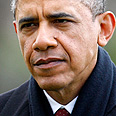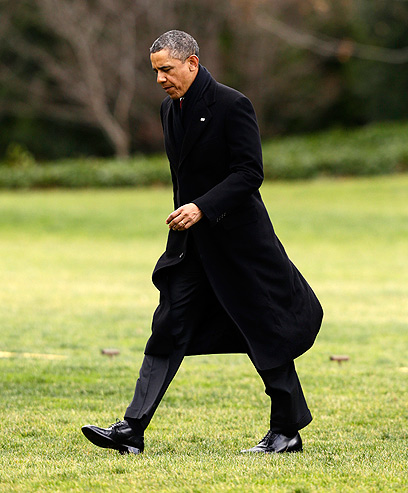
Obama, lawmakers meet over fiscal cliff
US president presents proposal to avoid tax hikes for middle-class Americans to Congressional leaders in last-chance effort aimed to avoid drastic austerity measures threatening economy's fragile recovery
The last-chance effort aimed to avoid the drastic austerity measures known as the "fiscal cliff" that automatically begin next week and threaten the US economy's fragile recovery.
Related stories:
- Obama nominates Kerry for secretary of state Obama tops Forbes 2012 power list; Netanyahu 23rd
- Op-ed: Let Obama lead the way
As the January 1 deadline nears, lawmakers and White House officials held out slim hope for a deal to avoid tax increases for most Americans and deep spending cuts, but it remained unclear whether congressional passage of legislation palatable to both sides was even possible.
Obama was not making a new offer at the meeting, but was instead spelling out again a plan he believes can pass the House of Representatives and Senate, said a source, who spoke on condition of anonymity because he was unauthorized to speak publicly about the private meeting.
Obama wants a bill to halt looming tax increases on all families making $250,000 a year or less and would extend unemployment benefits to many people about to lose it.

Obama cuts short his Hawaiian holiday (Photo: AP)
House of Representatives Speaker John Boehner, Senate Republican Leader Mitch McConnell, Senate Democratic Leader Harry Reid and House Democratic Leader Nancy Pelosi all attended Friday's White House meeting. Vice President Joe Biden and Treasury Secretary Timothy Geithner also attended.
Obama's Friday meeting with Congressional leaders was the first since November 16. The president, who had cut short his Hawaiian holiday to return to Washington, called for the meeting as top lawmakers blamed each other while claiming to be open to a reasonable last-minute bargain. It was likely to center on which income thresholds would face higher tax rates, extending unemployment insurance and preventing a cut in federal Medicare payments to doctors, among other issues.
For Obama, the eleventh-hour scramble represented a test of how he would balance strength derived from his re-election against an avowed commitment to compromise in the face of divided government. Despite early talk of a grand bargain between Obama and Boehner that would reduce deficits by more than $2 trillion, the expectations were now far less ambitious.
Chronic deficit spending
Both the White House and Congress are in this situation because of their inability, or unwillingness, in recent years to come to terms with the country's chronic deficit spending. A bitterly divided Congress hasn't helped.
Adding pressure is this week's warning from Geithner that the government would hit its $16.4 trillion borrowing limit on Monday, the final day of the year. That would make it harder for the US to pay its bills.
Republicans and Democrats said privately that any agreement would likely include an extension of middle-class tax cuts that had been set to expire at the end of the year, with increased tax rates at upper incomes - a priority that was central to Obama's re-election campaign.
A key question was whether Obama would agree to abandon his insistence during his re-election campaign on raising taxes on households earning more than $250,000 a year and instead accept a $400,000 threshold like the one he has offered in negotiations with Boehner.
The deal also would likely put off the scheduled spending cuts and extend expiring unemployment benefits, officials said.
Even to reach a lesser deal now, Obama and Reid would have to propose a package that McConnell would agree not to block.
McConnell on Thursday warned, "Republicans aren't about to write a blank check for anything the Democrats put forward just because we find ourselves at the edge of the cliff."
Nevertheless, he said he told Obama in a phone call late Wednesday that "we're all happy to look at whatever he proposes."
If a deal were to pass the Democratic-controlled Senate, Boehner would have to agree to take it to the floor in the Republican-controlled House.
Boehner discussed the fiscal cliff with Republican members in a conference call Thursday. Rep. Tom Cole, an ally of the speaker, did not rule out Republican support for some increase in tax rates – which Republicans have adamantly opposed for decades.
If a deal is not possible, it should become evident during Friday's meeting. If that occurs, Obama and the leaders would leave the resolution to the next Congress to address in January.
Such a delay could unnerve the stock market, which was down again Friday amid the developments in Washington. Economists say that if the tax increases are allowed to hit most Americans and if the spending cuts aren't scaled back, the recovering but fragile economy could sustain a shock.
But a sentiment is taking hold that Congress could weather the fiscal cliff without significant economic consequences if it acts decisively next month.
The debate over spending cuts, however, would have to start anew.
- Follow Ynetnews on Facebook and Twitter
- Receive Ynetnews updates directly to your desktop










